Introduction
Calpe, located on Spain’s Costa Blanca, is a highly sought-after destination for property buyers looking for a mix of stunning Mediterranean views, a pleasant climate, and excellent investment opportunities. Whether you’re searching for a vacation home, rental investment, or permanent residence, Calpe offers a variety of real estate options.
However, buying a house in a foreign country comes with challenges. Many buyers—both local and international—make common mistakes that can lead to financial setbacks, legal troubles, or unnecessary stress. Understanding these pitfalls can help ensure a smooth and successful purchase.
Why Do Buyers Choose Calpe?
✅ Mediterranean Lifestyle – Beautiful beaches, warm weather, and a relaxed atmosphere.
✅ Investment Potential – Growing demand for properties, both for short-term rentals and long-term appreciation.
✅ Foreign Buyer-Friendly – Spain welcomes international investors, and the Golden Visa program provides residency opportunities for large-scale buyers.
If you’re thinking of purchasing property in Calpe, make sure you are aware of the most common mistakes and how to avoid them.
👉 For a detailed step-by-step guide on buying property as a foreigner, check out:
How to Buy Property in Calpe as a Foreigner.

Rushing Into Payments
One of the biggest mistakes buyers make is making payments too quickly without ensuring everything is in order. Whether it’s an initial deposit, a reservation fee, or the full purchase price, sending money before completing due diligence can put your investment at risk.
Why Is Paying Too Soon a Mistake?
📉 Weakens Your Negotiation Power – Once money is transferred, it becomes harder to negotiate the price or conditions.
⚠️ Risk of Scams or Legal Issues – Some properties may have hidden debts, ownership disputes, or planning violations.
💰 No Refund Guarantee – If the purchase falls through, getting your money back can be challenging.
How to Avoid This Mistake?
✅ Consult a Lawyer First – Always have an independent real estate lawyer review the contract before making payments.
✅ Verify All Documents – Ensure the property title, debts, and ownership details are correct.
✅ Understand Payment Terms – Clarify when and how payments should be made (e.g., via escrow accounts).
🔎 Related Resource: Learn more about real estate financing in Calpe and how to structure payments securely.
📌 External Resources:
- Spain’s Land Registry (Registro de la Propiedad) – To verify property ownership and encumbrances.
- Idealista – To compare prices and property histories before making payments.
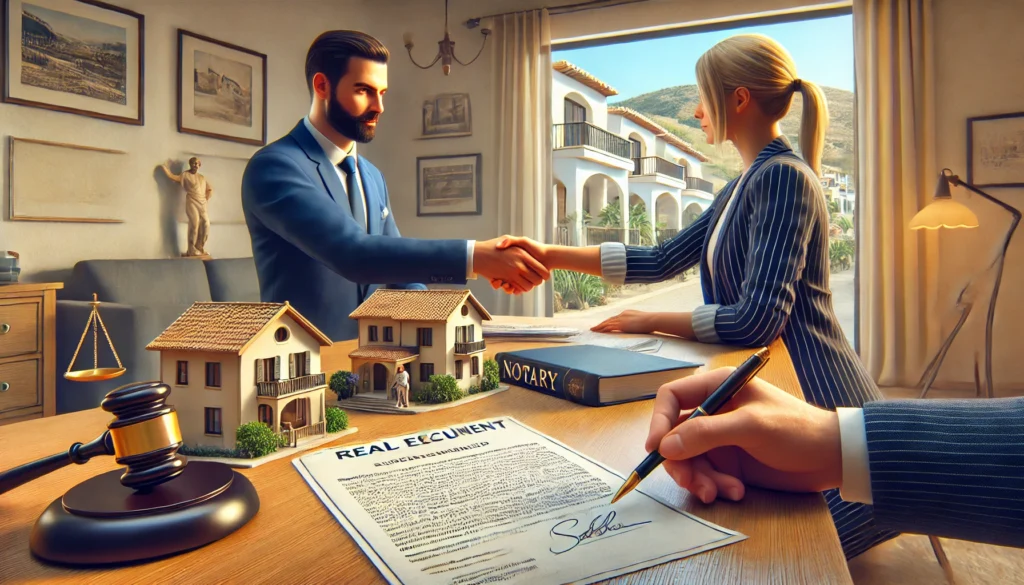
Relying on Verbal Agreements
A handshake or a verbal promise may seem trustworthy, but in real estate transactions, everything must be in writing. Buyers who rely on verbal agreements often face misunderstandings, unfulfilled promises, or even legal disputes.
Why Are Verbal Agreements Risky?
❌ No Legal Standing – If the seller fails to fulfill a promise, there is no way to enforce it legally.
❌ Changes in Terms – The seller might modify the agreed conditions later.
❌ Lost Protections – Without written agreements, you might lose your deposit or face additional hidden costs.
How to Avoid This Mistake?
✅ Put Everything in Writing – Ensure all agreements (including repairs, included furniture, or price changes) are documented in the contract.
✅ Use a Notary – In Spain, property purchases must be notarized to be legally valid.
✅ Keep Copies of All Documents – Save signed agreements, email confirmations, and written conversations.
🔎 Related Resource: Discover the best neighborhoods to buy a house in Calpe and why location plays a key role in contract terms.
📌 External Resources:
- Notaries of Spain (Consejo General del Notariado) – Find a registered notary to handle your transaction.
- Fotocasa – Research property listings and seller agreements.
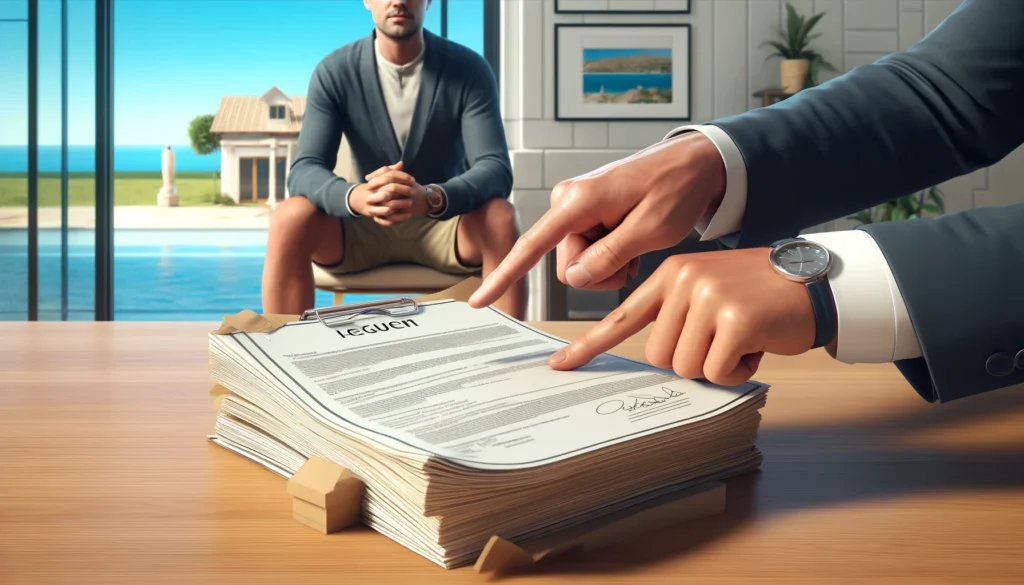
Insufficient Document Verification
One of the most critical mistakes buyers make when purchasing property in Calpe is failing to verify essential documents. Missing or incorrect paperwork can lead to legal issues, hidden costs, or even property disputes.
Key Documents to Verify Before Buying
✅ Nota Simple – This document, obtained from the Spanish Land Registry (Registro de la Propiedad), confirms ownership and any outstanding debts tied to the property.
✅ Property Title (Escritura Pública) – This document proves legal ownership and should match the details in the Land Registry.
✅ Cadastral Certificate (Certificado Catastral) – Confirms the property’s official size and boundaries.
✅ Urban Planning Certificate – Verifies that the property meets local zoning regulations and isn’t affected by future development projects.
✅ Occupancy Certificate (Cédula de Habitabilidad) – Ensures the home meets habitability standards and is legally fit for residence.
✅ Energy Performance Certificate (Certificado de Eficiencia Energética, CEE) – Required for all property transactions in Spain.
Common Issues to Watch For
⚠️ Discrepancies in Property Size – Ensure the square footage and land details match those in official records.
⚠️ Outstanding Debts or Mortgages – Properties with unpaid loans could transfer the debt to the new owner.
⚠️ Illegal Constructions or Extensions – Ensure all renovations or additions comply with local building codes.
How to Work with a Lawyer for Document Verification
Hiring a real estate lawyer ensures that all documentation is legitimate and protects you from hidden legal risks. Your lawyer can:
🔹 Request and review all property records from the Land Registry.
🔹 Verify that all permits are valid and up to date.
🔹 Ensure the seller has legal rights to transfer the property.
For more guidance, check out How to Buy Property in Calpe as a Foreigner for an in-depth legal process overview.
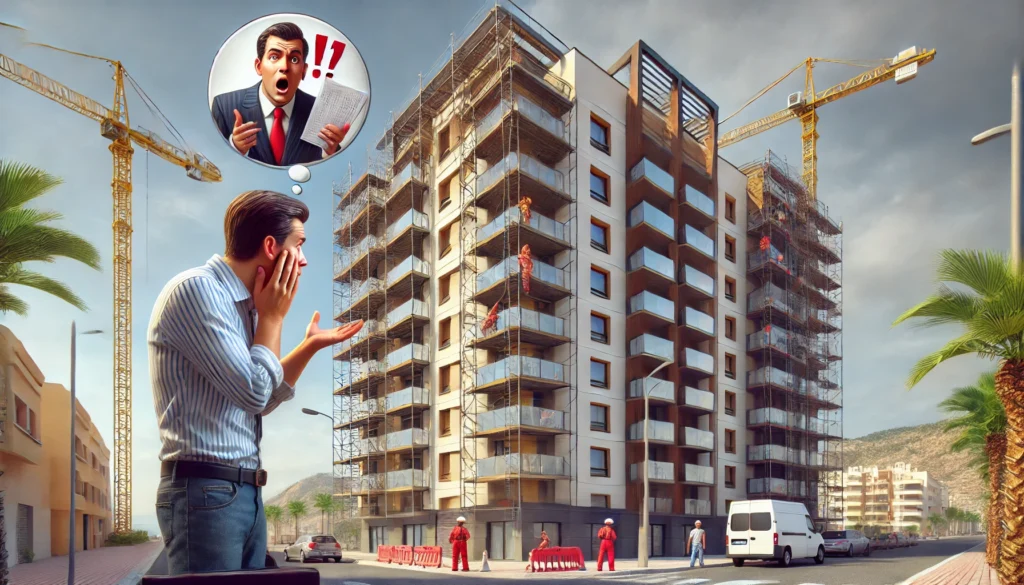
Overlooking Planned Maintenance Costs
When buying an apartment or property within a residential complex, many buyers fail to account for future maintenance expenses. Large-scale renovations—such as roof repairs, facade restorations, or shared facility upgrades—can result in unexpected financial burdens.
Why Maintenance Costs Matter
🏗 Major Renovations Can Be Expensive – If the building requires repairs, community members must contribute.
🏢 Apartment Complex Fees Vary – Monthly fees cover shared expenses, but unexpected costs can arise.
💰 Unexpected Assessments Can Increase Costs – If a major repair is needed, residents may be required to pay special assessments.
How to Check for Upcoming Maintenance Work
🔍 Ask the Homeowners’ Association (Comunidad de Propietarios) – They must disclose any planned repairs.
📜 Review Meeting Minutes (Actas de Reunión) – These documents detail past and future maintenance discussions.
🏦 Request the Property’s Debt-Free Certificate – Ensures the property has no unpaid community fees.
To avoid unexpected costs, ensure your lawyer reviews all homeowners’ association agreements before purchasing. For more information, check out Investing in Property in Calpe – Guide 2025.
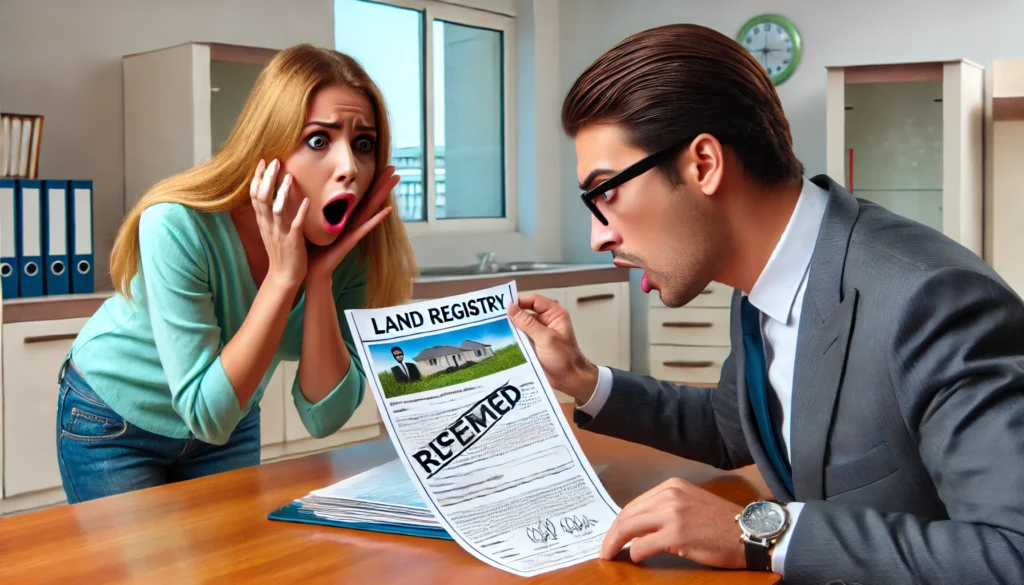
Not Verifying True Ownership
One of the biggest risks in Spanish real estate is purchasing a home from a seller who does not legally own the property. Whether due to inheritance complications, fraudulent listings, or hidden co-owners, failing to verify ownership can lead to costly legal disputes.
How to Confirm True Ownership
✅ Check the Nota Simple – Confirms who legally owns the property and lists any co-owners.
✅ Verify Inheritance Issues – Properties inherited by multiple heirs may require all parties to sign off on the sale.
✅ Ensure the Seller Has the Right to Sell – Some properties belong to defunct companies or individuals with ownership disputes.
Potential Ownership Issues to Watch For
⚠️ Undisclosed Co-Owners – The seller might not be the sole owner, requiring all co-owners to approve the sale.
⚠️ Encumbrances on the Property – The home may be involved in a legal case or financial dispute.
⚠️ Fraudulent Sellers – Some individuals pose as owners to scam buyers.
The Role of a Lawyer in Preventing Ownership Disputes
A real estate lawyer will:
🔹 Check all ownership records.
🔹 Confirm that no co-owners or heirs need to approve the sale.
🔹 Ensure the property is free from pending legal issues.
To protect your investment, always verify ownership before making payments. Learn more in our Guide to Buying a House in Calpe as a Foreigner.
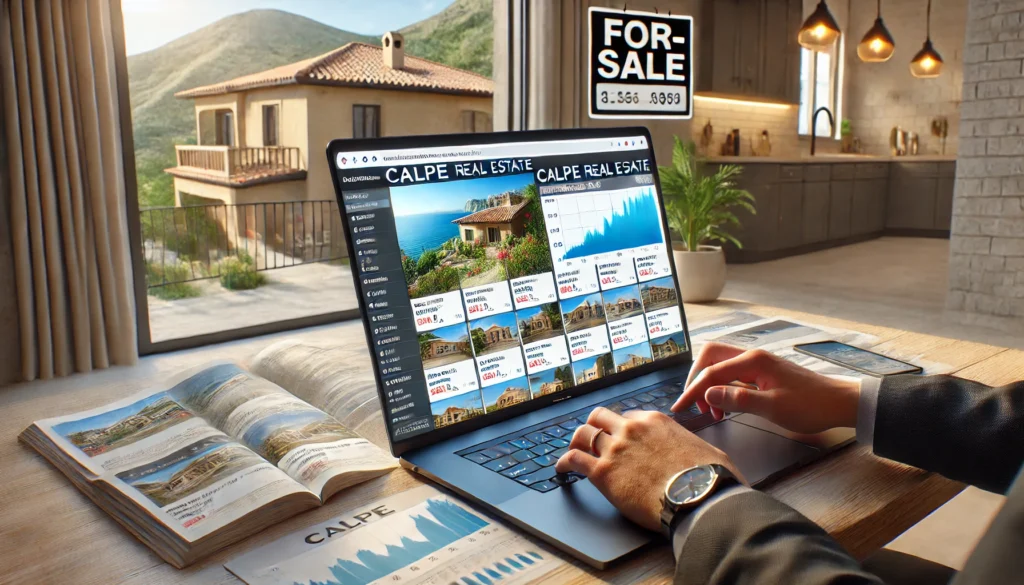
Inadequate Market Research
One of the most common mistakes buyers make when purchasing a home in Calpe is not researching the market properly. Without understanding historical property prices, neighborhood trends, and fair market values, buyers risk overpaying or missing better opportunities.
Why Comparing Prices and Market Trends Is Essential
📈 Avoid Overpaying – Some sellers list properties above market value, hoping to attract uninformed buyers.
🏡 Identify the Best Neighborhoods – Prices can vary significantly between coastal, city-center, and suburban areas.
🔎 Understand Market Cycles – Knowing if the market is rising, stable, or declining helps buyers time their purchase correctly.
How to Research Neighborhoods and Price Trends in Calpe
🔹 Check recent property sales – Websites like Idealista and Fotocasa provide insights into recent sale prices.
🔹 Use Government Property Registries – The Spanish Land Registry (Registro de la Propiedad) records property values.
🔹 Consult a Local Real Estate Agent – Agents provide insider knowledge about market trends.
🔹 Compare Investment Reports – Some firms publish annual real estate analysis for Spain.
💡 Recommended Tool: Check out Best Neighborhoods to Buy a Home in Calpe – 2025 for a detailed breakdown of Calpe’s top areas.

Neglecting Building and Pest Inspections
Many foreign buyers skip professional property inspections, only to discover structural problems, water damage, or pest infestations after moving in. Repairs can be costly, and some issues may violate local building codes, preventing legal ownership registration.
Common Property Defects That Could Lead to Expensive Repairs
🚧 Foundation Cracks – Can compromise structural integrity.
💧 Moisture & Mold – Often found in older homes or coastal properties.
🐜 Termites & Wood Damage – Common in houses near wooded areas.
🔌 Outdated Electrical Systems – Some older homes need rewiring to meet modern safety standards.
🚿 Plumbing Issues – Leaks or poor drainage systems can lead to severe damage.
Why Professional Inspections Are Essential
✅ Avoid Unexpected Expenses – Identifies costly issues before purchase.
✅ Negotiation Leverage – Buyers can request repairs or reduce the price based on inspection findings.
✅ Legal Compliance – Ensures the home meets Spanish building regulations.
How to Arrange a Structural Survey & Pest Control Check
📞 Hire a Certified Property Inspector – Look for Spanish-licensed surveyors.
📝 Request a Technical Building Report (Informe de Evaluación del Edificio – IEE) – Provides structural assessments.
🔍 Schedule a Pest Inspection – Essential for villas or homes near greenery.
🏠 Ask the Seller for Maintenance Records – Check past repairs and renovations.
💡 Learn more: Investing in Property in Calpe – Guide 2025 provides essential investment insights.
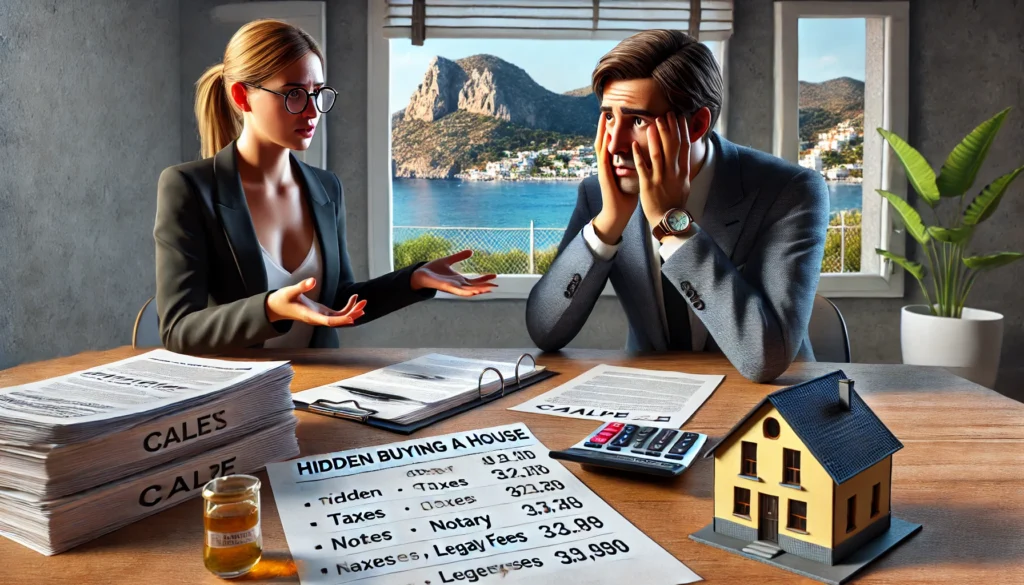
Not Defining a Clear Budget
Many homebuyers, especially first-time investors in Spain, fail to set a clear budget before purchasing a home. Without a financial plan, buyers risk overspending, missing essential costs, or struggling with unexpected fees.
Why Overspending Can Lead to Financial Strain
❌ Higher Mortgage Costs – Borrowing more than necessary increases long-term debt.
❌ Unaccounted Maintenance Expenses – Unexpected property repairs or homeowners’ association fees add up.
❌ Tax Obligations – Some buyers forget annual property taxes and ownership costs.
Steps to Create a Realistic Budget for Buying a House in Calpe
✅ Determine Your Maximum Purchase Price – Factor in mortgage limits, personal savings, and expected rental yields (if applicable).
✅ Include Transaction Costs (10-12% of Property Value) – Covering taxes, notary fees, and bank costs.
✅ Plan for Ongoing Costs – Budget for home insurance, community fees, and utility expenses.
✅ Account for Currency Exchange Rates – If buying from abroad, fluctuations in exchange rates can impact affordability.
Hidden Costs Buyers Often Overlook
📜 Notary Fees – Typically €600 – €1,500, depending on property value.
📄 Property Transfer Tax (ITP) or VAT (IVA) – 8-10% for resale homes, 10% VAT for new properties.
🏛 Stamp Duty (AJD) – 1.5% of purchase price for new homes.
🏦 Mortgage Costs – Bank fees, setup costs (1-2% of loan), and property valuation fees.
📍 Community Fees – Monthly payments for shared amenities in residential complexes.
💡 Want to finance your home? Read How to Get Financing to Buy a House in Calpe for mortgage insights.

Conclusion & Final Tips
Buying a home in Calpe is an exciting investment, but avoiding common mistakes is essential to ensure a smooth and profitable purchase. Many buyers rush into payments, overlook legal documents, or fail to conduct proper inspections, leading to unexpected financial burdens.
Recap of the Key Mistakes to Avoid When Buying a House in Calpe
✔ Rushing into payments – Secure all legal agreements before transferring money.
✔ Relying on verbal agreements – Always put everything in writing.
✔ Skipping document verification – Ensure ownership and property details match the registry.
✔ Ignoring planned maintenance costs – Hidden fees can impact your budget.
✔ Not researching the market – Compare neighborhood prices and historical trends.
✔ Skipping building inspections – Structural issues can lead to costly repairs.
✔ Failing to define a budget – Unexpected costs like taxes and fees can strain finances.
The Importance of Working with Professionals
📌 Real Estate Agents – Guide you through the market and negotiate better deals.
📌 Lawyers – Verify property legality, contracts, and hidden liabilities.
📌 Surveyors & Inspectors – Assess the property’s structure and condition.
📌 Mortgage Brokers – Help secure the best financing options for foreign buyers.
📢 Final Advice: Take your time, conduct thorough research, and seek expert guidance to avoid potential pitfalls. Buying a property is a major decision—getting it right from the start will save you time, stress, and money.
💡 Looking for expert guidance? Check out How to Buy Property in Calpe as a Foreigner for a step-by-step buying guide.
Frequently Asked Questions (FAQs)
1️⃣ What are the most important documents to check when buying property in Spain?
✔ The property title (Escritura Pública), land registry report (Nota Simple), and building permits are crucial to verifying ownership and legality.
2️⃣ Should I hire a real estate lawyer when buying a house in Calpe?
✔ Yes! A lawyer ensures that the contract is legal, the seller has the right to sell, and that there are no outstanding debts on the property.
3️⃣ What are the hidden costs when buying a home in Calpe?
✔ Buyers should budget 10-12% extra for taxes, including Property Transfer Tax (ITP), VAT (IVA) on new homes, notary fees, mortgage setup fees, and land registration fees.
4️⃣ How can I research the best areas to buy a home in Calpe?
✔ Use online platforms like Idealista, Fotocasa, and Kyero, and consult local real estate agents. You can also check out our detailed guide: Best Neighborhoods to Buy a Home in Calpe – 2025.
5️⃣ Is it necessary to conduct a building inspection before purchasing?
✔ Absolutely! A structural inspection helps identify hidden defects, potential pest problems, and necessary repairs, which can be costly if overlooked.
💡 Looking to invest in Calpe’s booming real estate market? Explore our full Property Investment Guide 2025 to make an informed decision! 🚀
